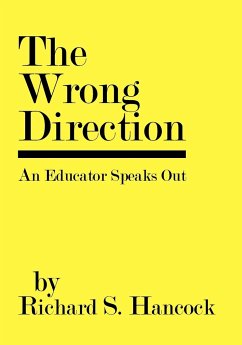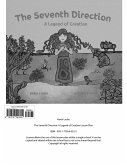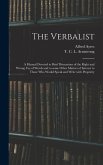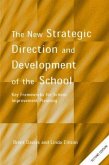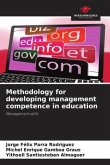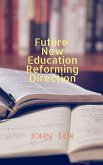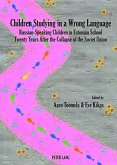- Broschiertes Buch
- Merkliste
- Auf die Merkliste
- Bewerten Bewerten
- Teilen
- Produkt teilen
- Produkterinnerung
- Produkterinnerung
Is America's public education going in the wrong direction? Take a look at this serious educator's pragmatic approach to educational reform in terms of history, theory, systems and "political correctness".
Andere Kunden interessierten sich auch für
![The Seventh Direction Teacher Lesson Plan The Seventh Direction Teacher Lesson Plan]() Kevin LockeThe Seventh Direction Teacher Lesson Plan8,49 €
Kevin LockeThe Seventh Direction Teacher Lesson Plan8,49 €![All the Clocks Are Wrong! All the Clocks Are Wrong!]() Benno KreuzmairAll the Clocks Are Wrong!16,99 €
Benno KreuzmairAll the Clocks Are Wrong!16,99 €![The Verbalist: a Manual Devoted to Brief Discussions of the Right and Wrong Use of Words and to Some Other Matters of Interest to Tho The Verbalist: a Manual Devoted to Brief Discussions of the Right and Wrong Use of Words and to Some Other Matters of Interest to Tho]() The Verbalist: a Manual Devoted to Brief Discussions of the Right and Wrong Use of Words and to Some Other Matters of Interest to Tho36,99 €
The Verbalist: a Manual Devoted to Brief Discussions of the Right and Wrong Use of Words and to Some Other Matters of Interest to Tho36,99 €![The New Strategic Direction and Development of the School The New Strategic Direction and Development of the School]() Brent DaviesThe New Strategic Direction and Development of the School65,99 €
Brent DaviesThe New Strategic Direction and Development of the School65,99 €![Methodology for developing management competence in education Methodology for developing management competence in education]() Jorge Félix Parra RodríguezMethodology for developing management competence in education62,99 €
Jorge Félix Parra RodríguezMethodology for developing management competence in education62,99 €![Future New Education Reforming Direction Future New Education Reforming Direction]() John LokFuture New Education Reforming Direction32,99 €
John LokFuture New Education Reforming Direction32,99 €![Children Studying in a Wrong Language Children Studying in a Wrong Language]() Children Studying in a Wrong Language60,50 €
Children Studying in a Wrong Language60,50 €-
-
-
Is America's public education going in the wrong direction? Take a look at this serious educator's pragmatic approach to educational reform in terms of history, theory, systems and "political correctness".
Hinweis: Dieser Artikel kann nur an eine deutsche Lieferadresse ausgeliefert werden.
Hinweis: Dieser Artikel kann nur an eine deutsche Lieferadresse ausgeliefert werden.
Produktdetails
- Produktdetails
- Verlag: Trafford Publishing
- Seitenzahl: 528
- Erscheinungstermin: 6. Oktober 2005
- Englisch
- Abmessung: 254mm x 178mm x 28mm
- Gewicht: 982g
- ISBN-13: 9781412057851
- ISBN-10: 141205785X
- Artikelnr.: 21541017
- Herstellerkennzeichnung
- Libri GmbH
- Europaallee 1
- 36244 Bad Hersfeld
- gpsr@libri.de
- Verlag: Trafford Publishing
- Seitenzahl: 528
- Erscheinungstermin: 6. Oktober 2005
- Englisch
- Abmessung: 254mm x 178mm x 28mm
- Gewicht: 982g
- ISBN-13: 9781412057851
- ISBN-10: 141205785X
- Artikelnr.: 21541017
- Herstellerkennzeichnung
- Libri GmbH
- Europaallee 1
- 36244 Bad Hersfeld
- gpsr@libri.de
Richard S. Hancock was born in 1929 in Bayonne, New Jersey. He grew up in Bayonne during the years of the Depression and World War II. His childhood could best be described as a period of sporadic economic deprivation coupled with after-school employment beginning at age nine. Hancock became seriously involved with education at the age of thirty-three. While studying for his Bachelor of Arts degree at Newark State College, he began teaching industrial arts. Prior to age 33 he had attained 30 credits in Business Administration, attending evening programs at Rutgers University Extension Division. Having worked for 15 years in business and industry, mainly in supervisory and sales positions, school administration had special interest for him. Upon completion of the BA degree he immediately enrolled in a masters program in school administration and supervision. In addition to attaining a Master's degree he has completed numerous post-graduate courses mainly in Vocational, Adult Education and Administration. Holding New Jersey certification as Teacher, Cooperative Education Coordinator, Supervisor, Principal and School Administrator (Superintendent), he has taught courses from grades five through the graduate level of college. Administrative titles have included Principal, Supervisor, and Director of various district-wide administrative areas. Coupling his childhood and work experiences with his formal education, Hancock developed a philosophy of education that could best be described as practical. In addition, he served his local teachers'association as vice president and president and was a member for eighteen months before becoming disillusioned with what he perceived as pure unionism. Six years after his association experience he was elected to his local school board, ending a six-year tenure as its president. Working with negotiations and grievances from both sides and attending training sessions in both state and national school boards, and national education associations, he is able to look at education from several viewpoints: taxpayer, parent, student, teacher, and management. (NOTE: In the world of education, management is referred to as administration). Hancock served as President of the Florida Association of Scholars, a State Affiliate of the National Association of Scholars. Hancock has studied most of the so-called innovations and reforms in education and looks at their theories, and the intentions of their originators. Unlike many traditional educators he looks for results and has little tolerance for well-intended ideas that simply do not work, but are continued despite bringing unintended negative results. Considering himself to be a late starter, he empathizes with the late bloomer. He has strong feelings, which come through in this book about the miseducation of most students and, in particular, the slow learner and the gifted and talented. Hancock has completed what can be considered a pragmatic approach to needed Educational Reform. His book is infused with concern for the current and future generations of students, the future of his country and civilization! His voice is direct and clear: "He tells it like it is." It is part of Dick's enduring integrity that he "has" to give his opinions as forcefully as possible. His writing is not that of a popular columnist or an educational theorist, it is more importantly, the voice of a man who has been personally involved with education, and who cares deeply about the individual's rights and responsibilities in society. Through this teaching and administrative years, through the process of researching for his book and in his contacts with a great diversity of people, he has enriched the lives of many! He challenges us to think carefully and act.

